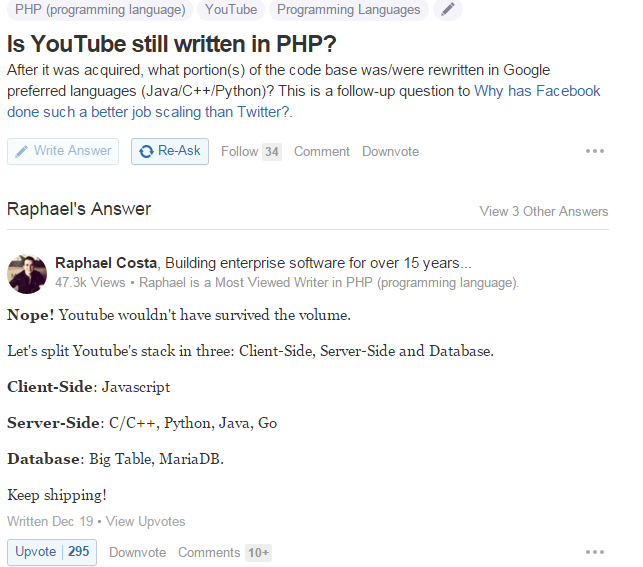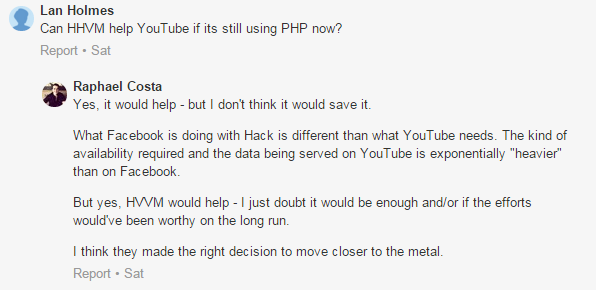I get Quora summary emails despite not being a Quora user, and sometimes I see very interesting questions, and more often than not very incompetent answers… rather, incompetent answers written very well so they sound like they could be correct. Here's one example:
Well, as most of you know, YouTube was never written in PHP, and they could've gained this much by just looking up YouTube on Wikipedia. I think the second part of the question is an interesting one, however the answer is dog shit.
Primarily because it's a question of scalability with two different types of platforms. Sure, Twitter and Facebook seem similar enough. They're both web sites full of assholes bragging about themselves (myself included) and old guys and oily nice guys trying to pick up strange, but their problems are completely different.
So, this is a classic thing of "anything is faster/better than PHP so therefore if it used PHP it would've failed," which is totally stupid and based on nonsense.
Twitter works in ever changing content where historical entries are rarely retrieved, Facebook does pretty much the opposite. I suggest looking up the histories of both how Twitter and Facebook have dealt with scalability on websites like highscalability.com and also YouTube has tons of videos where their engineers have discussed it. Note that you could only listen to information provided by actual Twitter and Facebook insiders, not random morons who think they've got it all figured out, that's why I'm not listing it all here myself.
YouTube could've survived the volume, because it survived with Python, which is slower than PHP in a lot of ways, but I think any actual developers reading this, whether or not they love or hate Python or PHP, know that YouTube's bottlenecks are database and bandwidth, not their code backend. And there's plenty of videos on YouTube of developers from there stating this very fact too.
So, this is a classic thing of "anything is faster/better than PHP so therefore if it used PHP it would've failed," which is totally stupid and based on nonsense. Sure, PHP used to really suck, especially in the days YouTube launched, but that has nothing to do with their success or failure.
But oh it gets worse:
Facebook's HHVM still couldn't be enough? Well, Raphael Costa claims to have 15 years in enterprise software, and I believe it, because it would explain why most enterprise software systems are garbage, because their engineers are incompetent.
Let's just point out why this is nonsensical garbage:
- Facebook used PHP and expanded with it beyond the popularity of YouTube, and yet YouTube couldn't have used it?
- Facebook is more popular than YouTube, so this makes no damn sense at all. I guess I said that already.
- Facebook also serves video.
- Most importantly: serving video literally has not a fucking thing to do with the language you run on the backend, because you're serving them as flat files or from CDNs. This is true in the case of both YouTube and Facebook, and also your major online porn video sites.
Yet, his post gets the most upvotes, and he is considered authoritative. This is just one example of Quora really being no better than Yahoo answers, especially nowadays. I've never used Quora or contributed, and this is pretty much why.


